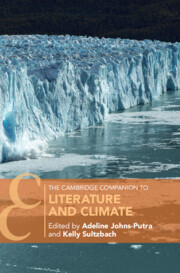Book contents
- The Cambridge Companion to Literature and Climate
- The Cambridge Companion to Literature and Climate
- Copyright page
- Contents
- Figures
- Notes on Contributors
- Introduction
- Part I Historical Shifts in Climate Consciousness
- Part II Current Issues in Climate Change Criticism
- Part III Ways of Telling Climate Stories
- Part IV Dialogic Perspectives on Emerging Questions
- Science Fiction and Future Fantasies
- Collective Climate Action
- Love Letters to the Planet
- 15 Meteorology of Form
- 16 Perspective-Taking, Empathy, and Virtuality in Jorie Graham’s Fast
- Diverse Indigenous Voices on Climate
- Redefining ‘the Real’
- Selected Bibliography
- Index
- Cambridge Companions to …
16 - Perspective-Taking, Empathy, and Virtuality in Jorie Graham’s Fast
from Love Letters to the Planet
Published online by Cambridge University Press: 31 March 2022
- The Cambridge Companion to Literature and Climate
- The Cambridge Companion to Literature and Climate
- Copyright page
- Contents
- Figures
- Notes on Contributors
- Introduction
- Part I Historical Shifts in Climate Consciousness
- Part II Current Issues in Climate Change Criticism
- Part III Ways of Telling Climate Stories
- Part IV Dialogic Perspectives on Emerging Questions
- Science Fiction and Future Fantasies
- Collective Climate Action
- Love Letters to the Planet
- 15 Meteorology of Form
- 16 Perspective-Taking, Empathy, and Virtuality in Jorie Graham’s Fast
- Diverse Indigenous Voices on Climate
- Redefining ‘the Real’
- Selected Bibliography
- Index
- Cambridge Companions to …
Summary
Recent studies in environmental psychology have shown how acts of perspective-taking can increase empathy in participants, leading to a ‘green nudge’ effect in relation to climate change. Similar proposals recur in ecocritical approaches to climate change fiction, influenced by long-standing arguments on fiction’s capacity to improve ‘theory of mind’. To further understand, but also to problematise and thus develop, these discussions of perspective-taking, I identify the parallels between these claims and those concerning virtual reality (VR) as an ‘empathy machine’, as well as those counter-claims regarding VR as an ‘appropriation machine’ that commodifies the experience of others. Jorie Graham’s poetry collection Fast (2017) explores the possibilities and difficulties of generating environmental empathy via material and simulated means, the latter inclusive of both textual and digital forms. In my analysis, I show how Graham generates a deliberately unstable and unreliable perspective-taking process with regard to human and non-human others. Consequently, I argue that her poems contribute a crucial interpretation of perspective-taking as a provisional act that at once reveals our strong human desire to connect with others, as well as our (potentially inevitable) inability to do so.
Keywords
- Type
- Chapter
- Information
- The Cambridge Companion to Literature and Climate , pp. 244 - 254Publisher: Cambridge University PressPrint publication year: 2022



